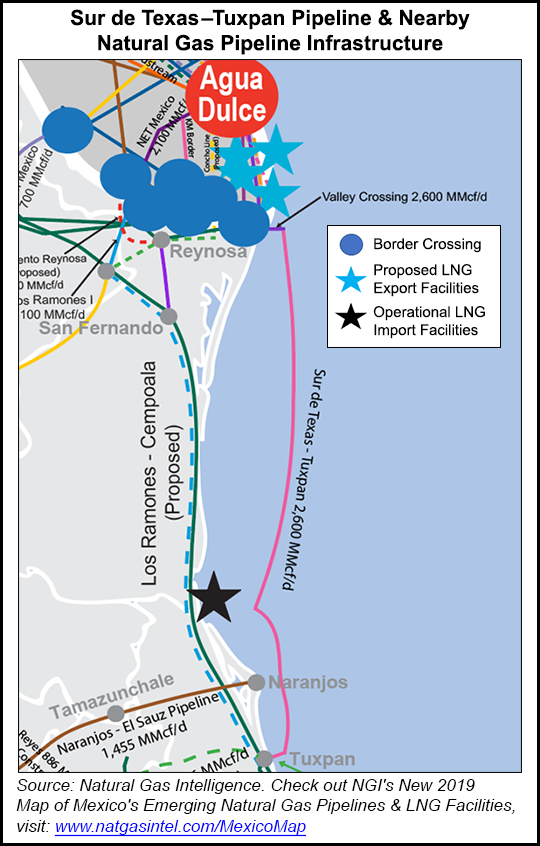NGI Mexico GPI | Infrastructure | NGI All News Access
TC Energy Pushes Back In-Service Dates for Delayed Mexico Pipelines
TC Energy Corp., until this week known as TransCanada Corp., has officially pushed back the expected in-service dates for three natural gas pipeline projects under construction in Mexico, which call for combined investment of $3 billion.

The projects comprise the 2.6 Bcf/d Sur de Texas-Tuxpan, 886 MMcf/d Tuxpan-Tula, and 886 MMcf/d Tula-Villa de Reyes pipelines, all of which were tendered by anchor customer Comisión Federal de Electricidad (CFE), Mexico’s state-owned power utility.
The offshore Sur de Texas-Tuxpan project “has experienced force majeure events that have delayed in-service,” TC said in its 1Q2019 report to shareholders.
“Some events are subject to potential dispute and we have taken measures to protect our interests under the contract. Construction and commissioning activities are progressing such that we anticipate mechanical completion in May with an expected June 2019 in-service.”
In the fourth quarter report, TC had forecast an in-service date of early in the second quarter for the nearly 500-mile pipeline, considered critical for alleviating gas supply constraints for power generators and industrial consumers in southeastern Mexico amid declining gas output by national oil company Petróleos Mexicanos (Pemex).
CEO Tania Ortiz of Infraestructura Energética Nova (IEnova), the joint venture partner on the pipeline, said last week, “We should be calling for gas in the next couple of weeks to do our testing and line packing,” and that bad weather has prevented completion of the final offshore tie-ins.
TC explicitly blamed Mexico’s energy ministry Sener for stalled progress on the 178-mile Tuxpan-Tula pipe, which is meant to transport U.S.-produced gas from Tuxpan, Veracruz state, to power plants in Puebla and Hidalgo states.
“Commencement of construction of the central segment of the Tula project has been delayed due to a lack of progress by the Secretary of Energy, the governmental department responsible for indigenous consultations,” TC said. “Project completion has been revised to the end of 2020.”
The segment in question is in Hidalgo, the same state in which Tula-Villa de Reyes is facing delays.
“Construction of the Villa de Reyes project is ongoing with a phased in-service anticipated to commence in the second half of 2019,” TC said. The company is now forecasting construction of Villa de Reyes to finish in 2020, compared to the 4Q2018 forecast for this year.
The company said it has “negotiated separate CFE contracts that would allow certain segments of Tula and Villa de Reyes to be placed in service when facilities are complete and gas is available.”
The Villa de Reyes and Tula pipelines both depend on the marine pipeline’s completion to receive gas.
Mexico President Andrés Manuel López Obrador and CFE General Director Manuel Bartlett have called for renegotiating take-or-pay natural gas transport contracts with TC, IEnova and other developers of stalled pipeline projects meant to increase the flow of abundant and cheap gas from Texas into Mexico.
Under the contracts’ force majeure clauses, CFE must make fixed capacity payments to the developers. El Economista on Tuesday reported that Bartlett said he would reveal next week the advances made so far in negotiations with the different pipeline developers.
Excluding gas consumed by Pemex, imports accounted for 89% of the available gas in Mexico during January, according to the Comisión Nacional de Hidrocarburos (CNH).
TC reported net income of US$744.5 million (81 cents/share) during the quarter, versus US$544.3 million (62 cents) in the corresponding 2018 period.
© 2024 Natural Gas Intelligence. All rights reserved.
ISSN © 2577-9877 | ISSN © 2577-9966 |
